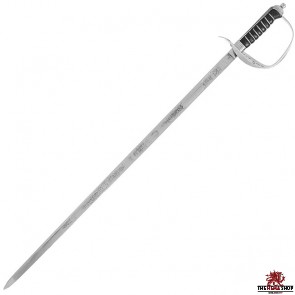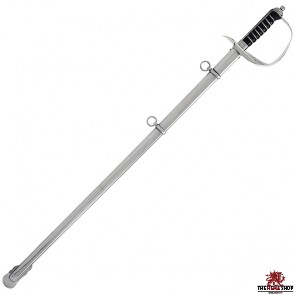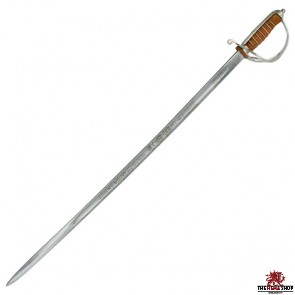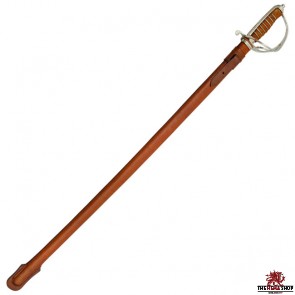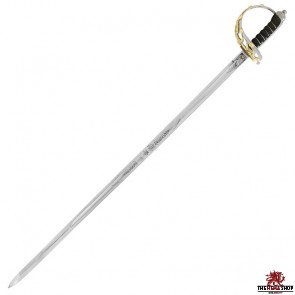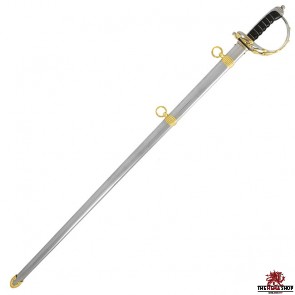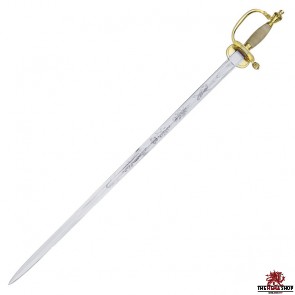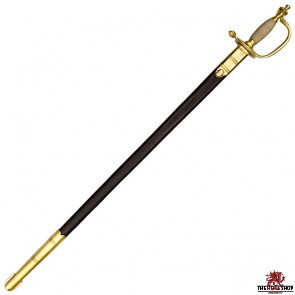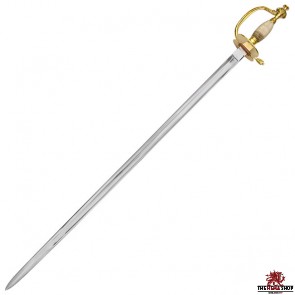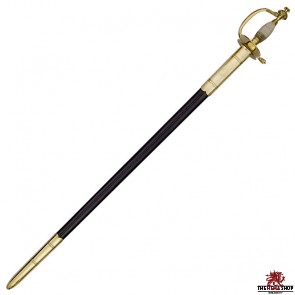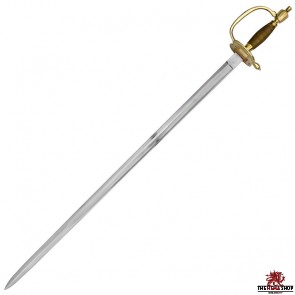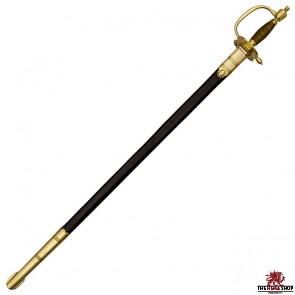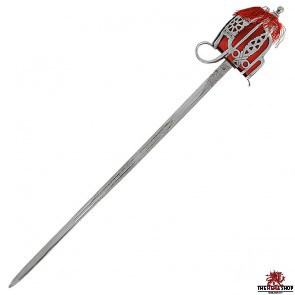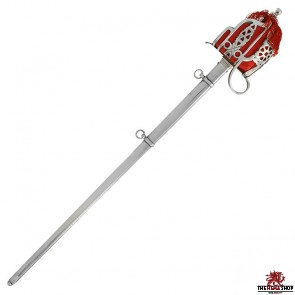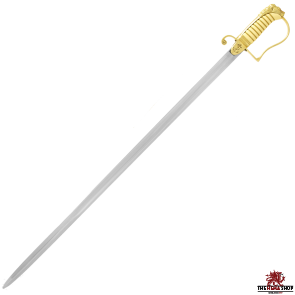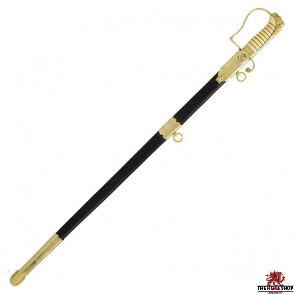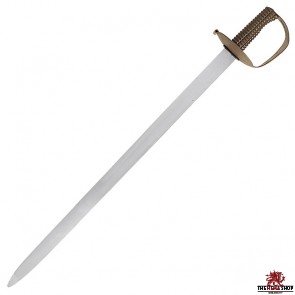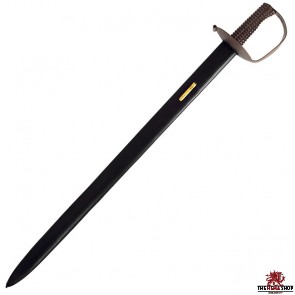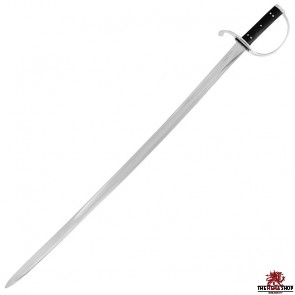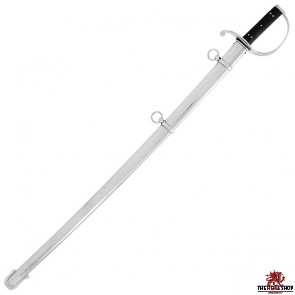British Military Swords
-
British Infantry Officer's Sword - ER 1897 Pattern (Steel Scabbard)
This sword is considered by some to be the best fighting sword ever issued to a British Officer. As such it has never been replaced and is the current issue sword within the British Army. The only difference between this sword and its Victorian predecessor is the cypher of the reigning monarch at the time of issue. The polished blade has been forged from AISI 1065 High Carbon Steel and has been well tempered.
Learn More
Scabbard included. Replacement steel scabbard and leather scabbard available separately.
Total length: 98 cm
Blade length: 82.5 cm
Grip length: 10.5 cm
Weight: 0.902 kg
Blade thickness (base): 5.6 mm
Blade thickness (CoP): 4.7 mm
Blade width (base): 2.3 cm
Blade width (CoP): 2 cm
Point of Balance (PoB): 14 cm
Centre of Percussion (CoP): 26 cm
Blade: AISI 1065 High Carbon Steel
Edge: Blunt
Pommel: Nut
Scabbard: Steel
All dimensions are approximate and may vary from piece to piece.Excl. Tax: £208.33 Incl. Tax: £250.00 -
British Artillery Officer's Sword - 1821 Pattern
This replica of a 19th Century Royal Artillery Officer’s Sword has an embossed, unsharpened blade of AISI1065 High Carbon Steel. The hilt is of brass and the grip is wrapped with brown leather and inlaid with bands of twisted wire.
Learn More
The wooden scabbard wrapped with brown leather is in the ‘’Sam Browne’’ style, which became standard issue in the Boer War and into WWI. It has a steel throat piece, and an integrated, leather strap with a hole for a hanging pin. Comes with a wooden scabbard wrapped in fine leather.
Total length: 106cm
Blade length: 90cm
Grip length: 11.7cm
Weight: 906g
Blade thickness (base): 0.6cm
Blade width (base): 2.5cm
Blade: AISI 1065 High Carbon Steel
Edge: Blunt
Pommel: Nut
Scabbard: Leather, Wood, Steel
All dimensions are approximate and may vary from piece to piece.Excl. Tax: £187.50 Incl. Tax: £225.00 -
British Household Cavalry Sword - 1834 Pattern
After the Crimean War there were many changes made within British Heavy Cavalry Regiments. One of these changes was the adoption of a variation of the 1st Life Guards Sword by the 2nd Life Guards. This sword served throughout the Boer War and WWI until the regiments were amalgamated in 1922. It still serves today as the official state sword of the Life Guards. The polished blade has been forged from EN9 steel and has been well tempered.
Learn More
Total length: 116 cm
Blade length: 99.5 cm
Grip length: 11 cm
Weight: 1.202 kg
Blade thickness (base): 7.4 mm
Blade thickness (CoP): 5.5 mm
Blade width (base): 3 cm
Blade width (CoP): 2.5 cm
Point of Balance (PoB): 21 cm
Centre of Percussion (CoP): 30 cm
Blade: AISI 1065 High Carbon Steel
Edge: Blunt
Pommel: Peened
Scabbard: Steel, Brass
All dimensions are approximate and may vary from piece to piece.Excl. Tax: £183.33 Incl. Tax: £220.00 -
British Infantry Officer's Sword - 1796 Pattern
This replica of the 1796 British Infantry Officer sword has a blade of unsharpened, tempered high carbon steel. Both sides of the blade feature the embossed cyper of the British Crown surmounted extensively by royal devices and floral motifs.
Learn More
It has a hilt of brass and a grip wrapped in copper wire that is plated with silver. Half of the guard is hinged and folds for ease of carry at the hip. The scabbard is of leather with brass accents.
Total length: 95cm
Blade length: 80cm
Grip length: 6.5cm
Weight: 784g
Blade thickness (base): 0.7cm
Blade width (base): 2.5cm
Point of Balance (PoB): 31cm
Blade: AISI 1065 High Carbon Steel
Edge: Blunt
Pommel: Nut
Scabbard: Leather, Wood, Brass
All dimensions are approximate and may vary from piece to piece.Excl. Tax: £187.50 Incl. Tax: £225.00 -
British Infantry Officer's Sword - 1796 Pattern
When the British Army standardized the swords to be carried by infantry officers in 1796 this is the sword they settled on; a spadroon-like cut-and-thrust sword with simple, but elegant Georgian styling that hearkened back to the Smallswords carried by gentlemen in earlier times. In just four years following, the blade was at the hip of practically all British Line Infantry Officers. Regardless of the standardization of form, the blades varied in their width and in their engraved decoration.
Learn More
Though widespread, it was not regarded as a good combat blade despite being used through the entirety of Britain’s contests with France in the Napoleonic Era. It would not be officially replaced until 1822 by the more elaborate ‘’Gothic-Hilted’’ sword and before then many officers had opted to acquire the 1803 Pattern sabre instead.
Total length: 100cm
Blade length: 85cm
Grip length: 6cm
Guard width: 9.5cm
Weight: 946g
Blade thickness (base): 0.6cm
Blade width (base): 2.5cm
Point of Balance (PoB): 33cm
Blade: AISI 1065 High Carbon Steel
Edge: Blunt
Pommel: Nut
Scabbard: Leather, Wood, Brass
All dimensions are approximate and may vary from piece to piece.Excl. Tax: £208.33 Incl. Tax: £250.00 -
British Sergeant Sword - 1796 Pattern
This recreation of the British 1796 Sergeant’s sword has a plain blade of unsharpened, tempered, high carbon steel. The hilt is entirely of brass. The scabbard is of leather with brass accents.
Learn More
The sword is the longer version used by the sergeants instead of the shorter blade used by the musicians, though the overall sword design and construction were inherently the same.
Total length: 95cm
Blade length: 80cm
Grip length: 9cm
Weight: 882g
Blade thickness (base): 0.6cm
Blade width (base): 2.5cm
Point of Balance (PoB): 32cm
Blade: AISI 1065 High Carbon Steel
Edge: Blunt
Pommel: Nut
Scabbard: Leather, Wood, Brass
All dimensions are approximate and may vary from piece to piece.Excl. Tax: £187.50 Incl. Tax: £225.00 -
Highland Officer’s Sword - 1828 Pattern
The 1828 Pattern Highland Officer’s Sword was issued to Officers of Scottish Highland Regiments such as the 92nd Regiment of Foot – The Gordon Highlanders. It was carried throughout many campaigns throughout the 19th Century and even saw service in WWI. Sergeants of such regiments were often issued with a plain bladed version.
Learn More
Our 1828 Pattern Highland Officer’s Sword is handcrafted like the originals and features a forged and tempered AISI1065 High Carbon Steel blade. The steel hilt features a red cloth liner, brown leather grip and red pommel tassel. The etched blade is housed in an authentically styled steel scabbard.
Total length: 100 cm
Blade length: 81 cm
Grip length: 13 cm
Weight: 1.360 kg
Blade thickness (base): 6.8 mm
Blade thickness (CoP): 5 mm
Blade width (base): 2.6 cm
Blade width (CoP): 2.5 cm
Point of Balance (PoB): 9 cm
Centre of Percussion (CoP): 25 cm
Blade: AISI1065 High Carbon Steel
Edge: Blunt
Pommel: Nut
Scabbard: Steel
All dimensions are approximate and may vary from piece to piece.Excl. Tax: £208.33 Incl. Tax: £250.00 -
British Royal Navy Officer's Sword - 1805 Pattern
Up until 1805 the Royal Navy did not have a regulation pattern sword. The sword that was introduced was modelled on the 1803 pattern infantry sabre that was previously carried by Navy and Marine officers. The 1805 pattern sword was used by Lord Horatio Nelson and he was no doubt armed with it at his most famous battle, The Battle of Trafalgar.
Learn More
After he was killed at the battle his sword was returned to England and is now on display in the Nelson Museum, Great Yarmouth, England. This sword was in constant use until it was replaced in 1827 by a newer model.
The polished blade has been forged from AISI 1065 High Carbon Steel and has been well tempered.
Total length: 95 cm
Blade length: 83 cm
Grip length: 10 cm
Weight: 0.905 kg
Blade thickness (base): 7.8 mm
Blade thickness (CoP): 5.3 mm
Blade width (base): 2.6 cm
Blade width (CoP): 2.2 cm
Point of Balance (PoB): 18 cm
Centre of Percussion (CoP): 25 cm
Blade: AISI 1065 High Carbon Steel
Edge: Blunt
Pommel: Peened
Scabbard: Leather, Wood, Brass
All dimensions are approximate and may vary from piece to piece.Excl. Tax: £212.50 Incl. Tax: £255.00 -
British Royal Navy Boarding Cutlass - 1804 Pattern
This pattern of sword was introduced during the Napoleonic Wars and saw service at the famous Battle of Trafalgar. Previous cutlasses shared a similar figure 8 hilt design but featured horn or leather grips that deteriorated quickly when exposed to seawater and changes in temperature.
Learn More
The introduction of an iron grip greatly extended the serviceable life of this sword. The hilts were traditionally painted or japanned to stop them from rusting. The blade has been forged from AISI 1065 High Carbon Steel and has been well-tempered. It is housed in a black hardened buff leather scabbard.
Total length: 89 cm
Blade length: 74.5 cm
Grip length: 12 cm
Weight: 1.458 kg
Blade thickness (base): 6.3 mm
Blade width (base): 3.6 cm
Point of Balance (PoB): 15 cm
Blade: AISI 1065 High Carbon Steel
Edge: Blunt
Pommel: Threaded
Scabbard: Leather, Brass
All dimensions are approximate and may vary from piece to piece.Excl. Tax: £135.00 Incl. Tax: £162.00 -
British Cavalry Sword - 1853 Pattern
The 1853 Pattern British Cavalry Sword was introduced during the Crimean War and saw service at the Battle of Balaclava – most notably during The Charge of the Light Brigade where the Russian gunner’s great coats proved to withstand all but the sharpest of blades but fell to the thrusts of the British cavalrymen.
Learn More
This sword was also the first to be issued to both Light and Heavy Cavalry regiments. The polished blade has been forged from AISI 1065 High Carbon Steel and has been well tempered.
Total length: 104 cm
Blade length: 90 cm
Grip length: 12 cm
Weight: 1.124 kg
Blade thickness (base): 7.9 mm
Blade thickness (CoP): 4 mm
Blade width (base): 3.2 cm
Blade width (CoP): 2.6 cm
Point of Balance (PoB): 18 cm
Centre of Percussion (CoP): 30 cm
Blade: AISI 1065 High Carbon Steel
Edge: Blunt
Pommel: Peened
Scabbard: Steel
All dimensions are approximate and may vary from piece to piece.Excl. Tax: £165.83 Incl. Tax: £199.00



